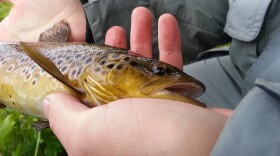This winter was an unusual one across the state.
Lakes had their earliest ice-off dates on record and then a late winter storm had ice rebuilding across the north.
Despite this, Director of DNR’s Bureau of Fisheries Management Justine Hasz says fish are right on schedule.
“We're getting back into what normally spring looks like, a sort of warm, cooler temperatures and the fish are really starting to get back on track with what they're supposed to be doing at this time of the year,” said Hasz.
Hasz expects walleye to have finished their spawning by the fishing opener on May 4.
There’s a new regulation in place that will reflect what anglers in the northern third of the state have been working with the last couple of years: there’s now a statewide three walleye bag limit.
“This does not change the regulations for bag limits on waters that have a limit that is currently less than three. So some lakes, we have a bag limit of one, this does not increase those lakes to three, they remain at one,” said Hasz. “This also does not change your personal daily bag limit, the personal daily bag limit for walleye will remain at five.”
There are new regulations regarding self-registration for small fishing tournaments, and multiple musky minimum length limits in lakes across the state.
You can view the regulation changes for the 2024-2025 fishing season here.
The state has more than 1.3 million licensed anglers in any given year.
With that many people fishing lakes and rivers, the Wisconsin DNR is reminding people to take steps to reduce the spread of aquatic invasive species and disease.
As WXPR previously reported, a parasite that impacts trout has been found for the first time in the state in Langlade County.
“Remove all water, aquatic vegetation, and all mud from your fishing equipment before leaving your fishing location. All fishing equipment, including boats, trailers, boots, waiters, and float tubes should be thoroughly cleaned and dried completely before using again. We just want to make sure that we can keep our resources as good as they are by preventing the spread of both AIS and disease,” said Hasz.
The DNR is also reminding anglers to check consumption advisories before fishing.
In addition to mercury advisories, there are now PFOS advisories for the Moen Chain and Hat Rapids Flowage area of the Wisconsin River.
“For waters that may have mercury, PCBs or PFAS, we want to make sure that the anglers who are catching their fish know that they are safe for them to eat,” said Hasz.
The DNR updated advisories and released its Choose Wisely guide earlier this year.











